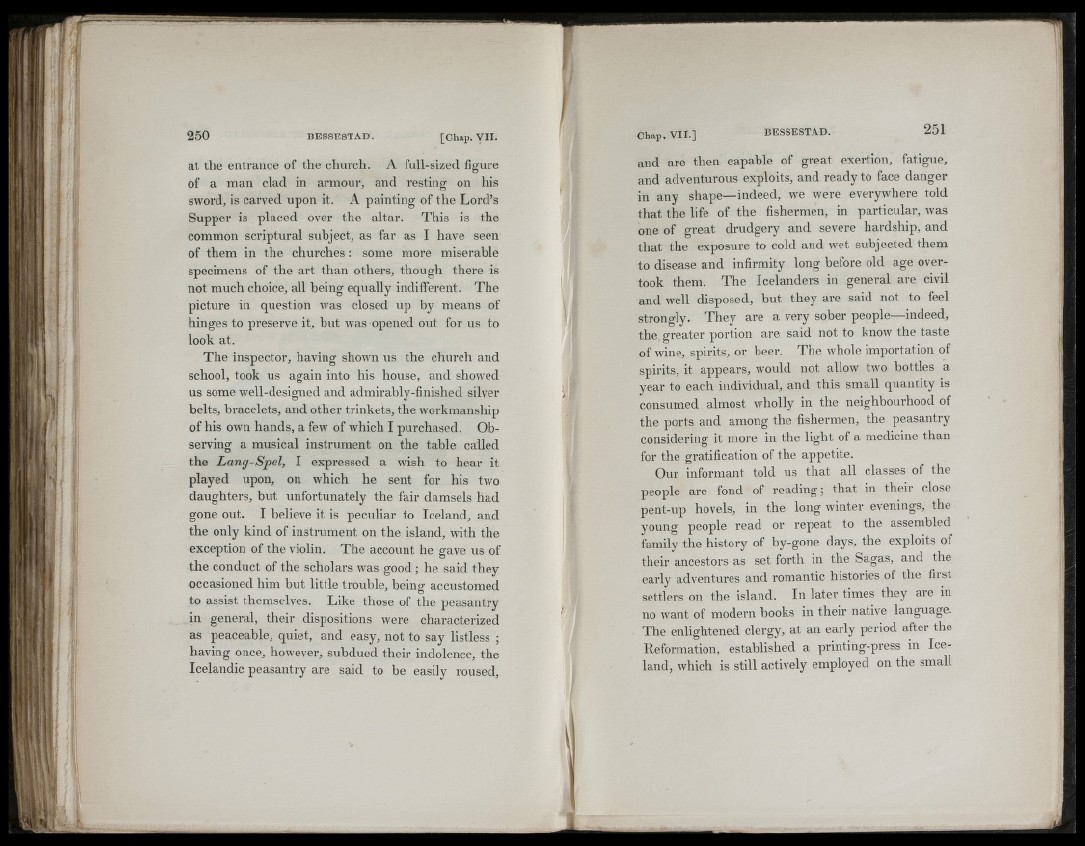
I
■
il 1. ;
I i
4 lii .
at the entrance of the church. A full-sized figure
of a man clad in armour, and resting on his
sword, is carved upon it. A painting of the Lord’s
Supper is placed over the altar. This is the
common scriptural subject, as far as I have seen
of them in the churches: some more miserable
specimens of the art than others, though there is
not much choice, all being equally indifferent. The
picture in question was closed up by means of
hinges to preserve it, but was opened out for us to
look at.
The inspector, having shown us the church and
school, took us again into his house, and showed
us some well-designed and admirably-finished silver
belts, bracelets, and other trinkets, the workmanship
of his own hands, a few of which I purchased. Observing
a musical instrument on the table called
the Lang-Spel, I expressed a wish to hear it
played upon, on which he sent for his two
daughters, but unfortunately the fair damsels had
gone out. I believe it is peculiar to Iceland, and
the only kind of instrument on the island, with the
exception of the violin. The account he gave us of
the conduct of the scholars was good; he said they
occasioned him but little trouble, being accustomed
to assist themselves. Like those of the peasantry
in general, their dispositions were characterized
as peaceable, quiet, and easy, not to say listless ;
having once, however, subdued their indolence, the
Icelandic peasantry are said to be easily roused.
I :
1",
aand
are then capable of great exertion, fatigue,
and adventurous exploits, and ready to face danger
in any shape—indeed, we were everywhere told
that the life of the fishermen, in particular, was
one of great drudgery and severe hardship, and
that the exposure to cold and wet subjected them
to disease and infirmity long before old age overtook
them. The Icelanders in general are civil
and well disposed, but they are said not to feel
strongly. They are a very sober people—indeed,
the greater portion are said not to know the taste
of wine, spirits, or beer. The Avhole importation of
spirits, it appears, would not allow two bottles a
year to each individual, and this small quantity is
consumed almost wholly in the neighbourhood of
the ports and among the fishermen, the peasantry
considering it more in the light of a medicine than
for the gratification of the appetite.
Our informant told us th a t all classes of the
people are fond of reading; that in their close
pent-up hovels, in the long ivinter evenings, the
young people read or repeat to the assembled
family the history of by-gone days, the exploits of
their ancestors as set forth in the Sagas, and the
early adventures and romantic histories of the first
settlers on the island. In later times they are in
no want of modern books in their native language.
The enlightened clergy, at an early period after the
Reformation, established a printing-press in Iceland,
which is still actively employed on the small